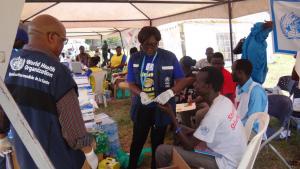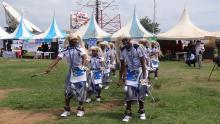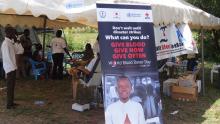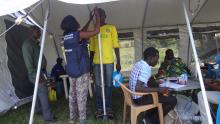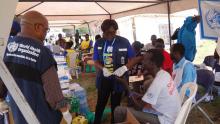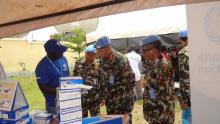United Nations Day: WHO South Sudan offers essential promotive health services in commemoration of UN’s 72nd Anniversary
25 October 2017 - As part of the events to mark the 72nd Anniversary of the day the UN Charter entered into force in 1945, the World Health Organization (WHO) in South Sudan, joined the rest of the UN family to provide essential promotive health services to the community on 24 October, 2017 at the Nyakuron Cultural Center, Juba.
The theme for this year “Building the future of South Sudan together”, demonstrated the UN family solidarity to support efforts to deliver development and humanitarian services to the people of South Sudan. The event shed light on the one UN achievements at the humanitarian level and raised awareness on the efforts of UN family in South Sudan.
WHO’s activities during the UN day ranged from health information dissemination, exhibitions, immunization, malaria testing and treatment, screening for diabetes and non-communicable diseases to blood donation drive. Despite the challenging situation in South Sudan, WHO is taking every opportunity to invest in promoting health and provide humanitarian support to the people of South Sudan.
On 18 October, WHO in collaboration with Unicef and other UN agencies jointly provided health education on a wide range of health and related issues at St Comboni’s Secondary School reaching over 300 students. This aimed at fostering adoption of informed choices among the school community. Dr Joseph Wamala, WHO Epidemiologist made a presentation on cholera prevention and control which highlighted the transmission, signs and symptoms, risk factors, prevention and take-home messages.
To promote immunization as a critical part of advancing health in developing setting like South Sudan, WHO in collaboration with Ministry of Health, Jubek state mobilized and vaccinated 72 children 0 – 59 months with Oral Polio vaccine and 21 with measles vaccine. In addition, 29 children less than one year received Pentavalent vaccine.
In South Sudan, malaria is the top cause of morbidity and mortality. Strategies to prevent and reduce malaria cases include environmental control measures, early detection, timely and correct treatment, use of mosquito bed nets. WHO conducted Rapid Diagnostic Tests for early and accurate malaria diagnosis that is essential for effective malaria management and surveillance within the community. A total of 76 people were tested for malaria, of whom 11 (1 child under 5 and 10 five years and above) tested positive and all except one received treatments of a three-day course of Artemether Lumefantrine. Health education and counselling was also provided.
World Health Organization (WHO), along with the National Blood Transfusion Services (NBTS), organized blood donation drive at Nyakuron Cultural Center, Juba. A total of 13 community members, WHO and other UN agency staff donated blood. Thanks to the generous support from the Government of Japan which has boosted availability of safe blood and blood products required to help patients that need blood transfusion, and save lives.
Due the rising global burden of Non-Communicable Diseases (NCDs), WHO organized awareness creation activities on NCDs and screening for NCD risk factors. A total of 43 adults 18 years and above participated in Diabetes Screening, Blood Pressure measurement and Weight Assessment. Of the 40 people screened for diabetes, 42% had Diabetes or Pre- diabetes (raised blood sugar). Of the 35 people who Blood Pressure was measured, 37% either had Pre-High Blood Pressure or had High Blood Pressure and out the 43 people whose weight was assessed, 47% were either overweight or obese., “This is just a tip of the iceberg because if nearly 40% of the adults screened today are overweight or obese, they are at high risk of hypertension, diabetes and all other diseases associated with obesity; much needs to be done to fight NCDs in South Sudan’ underscored Dr. Joseph Lou K Mogga, the WHO NCD focal person.
Tel : +211 956 991 637
Email : chitsvaja [at] who.int (chitsvaja[at]who[dot]int)
Malaria Focal Point
Tel: +211 955 633 854
Email: charimaril [at] who.int (charimaril[at]who[dot]int)
Email: moggaj [at] who.int (moggaj[at]who[dot]int)



